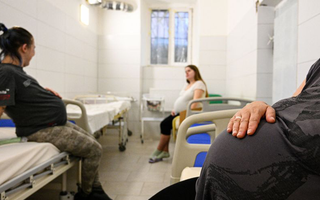Olivia Maurel had a difficult start in life. Reason: she was born through surrogacy. A painful childhood and a distressing time as a student convinced her that surrogacy is a harmful practice that should be abolished.

Surrogate mothers carry and bear children for people who cannot do so on their own. Read the articles on this topic on this page.
Featured
All articles with this tag
What is surrogacy?
Surrogacy is a practice in which a woman, known as a surrogate, carries and gives birth to a baby on behalf of another person or couple, known as the intended parents. Surrogacy is mostly used by people who do not want to get pregnant but still want to have a baby or people who have fertility problems or biological obstacles—for example, single people or LGBT couples.
There are two primary types of surrogacy: altruistic surrogacy and commercial surrogacy. The main difference between the two lies in whether the surrogate receives financial compensation beyond the reimbursement of her medical and pregnancy-related expenses.
-
In an altruistic surrogacy, the surrogate might get compensated for her expenses. Still, she does not profit from carrying someone's baby. Her expenses may include medical bills and other pregnancy-related costs. Critics argue that it is difficult to assess whether altruistic surrogacy only covers expenses and is an advance towards commercial surrogacy.
-
Commercial surrogates do get a financial reward for carrying a baby. Commercial surrogacy often involves fertility clinics and contractual agreements. The amount a surrogate mother receives varies from country to country. Currently, few countries allow commercial surrogacy.
What are popular surrogacy destinations?
The most popular surrogacy destination is the United States, specifically California. It is one of the few states that allows intended parents to establish their legal parental rights to their child before birth. In addition, everything around surrogacy is legally well-regulated. Besides giving wish parents confidence, this also drives up the price. The average price for a child is around 95,000 euros.
There are cheaper alternatives in Europe, but they are subject to change.
-
Ukraine is a popular destination with favourable legislation and lower prices (around €15,000 for a child). However, Russia's full-scale invasion complicates matters.
-
Russia and Georgia are also options. However, both countries recently forbade foreigners to use surrogates, making surrogacy more difficult to obtain.
-
In South America, commercial surrogacy is starting to gain ground, but the lack of legal frameworks concerns pro-surrogacy organisations.
Why do people oppose surrogacy?
Surrogacy is viewed differently, but among Christians and conservatives, the practice is controversial. In doing so, they look at both the role of the surrogate mother and the child.
-
Some argue that surrogacy can exploit women, particularly those from economically disadvantaged backgrounds, by pressuring them into carrying pregnancies for others for financial gain.
-
Critics contend that surrogacy can commodify children by treating them as products that can be bought and sold rather than as individuals with inherent rights.
-
Traditional family values and the natural order are also frequently pointed out in Christian circles. Surrogacy, they say, is not compatible with these views.
Where is surrogacy legal in Europe?
Country |
Legislation |
Altruistic |
Commercial |
Notes |
|---|---|---|---|---|
Last updated on 3/10/2023. Feedback? Contact us at info@cne.news.









